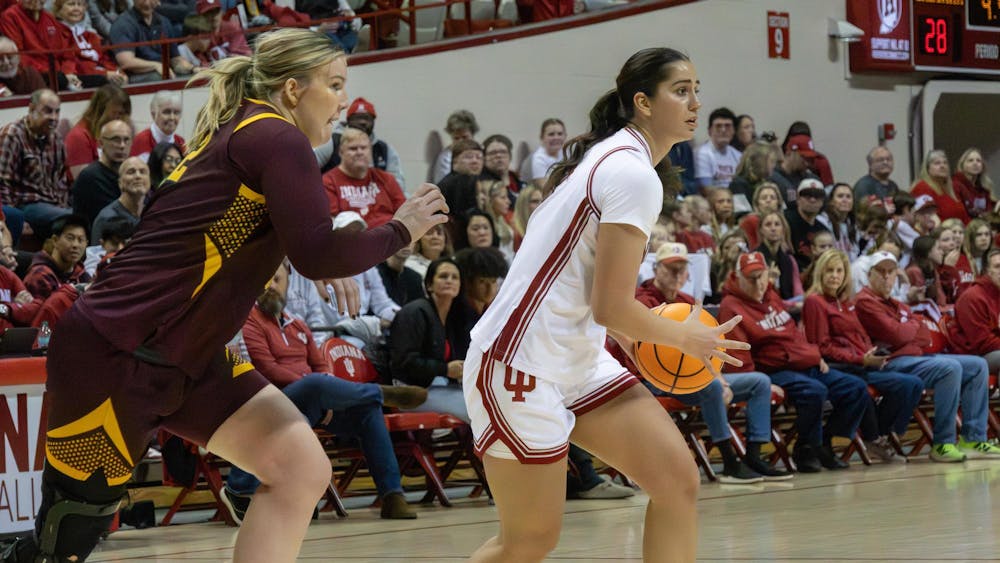A house sits alone and empty, a mere shadow of its former self. Pieces of the decaying façade lie on the ground. Windows are either boarded or broken. The lawn is unmowed, filled with brown clumps of grass that feebly grasp for light and water.\nPeering into an open window, one might notice pieces of decrepit ceiling lying on the floor, or furniture covered in dust and appliances coated with rust.\nThese are not scenes from a far-away area of urban decay. They can be seen among the six fraternity or sorority houses on campus that sit vacant.\nThe IU Office of Risk Management inspects fraternity and sorority houses when they are in use. But if the University no longer recognizes a house as an IU chapter, IU officials will not inspect it, said Eleanor Lahr, coordinator of Life Protection and Loss Control Training.\nNeither Monroe County nor the City of Bloomington has an ordinance requiring inspection of vacant properties.\n"We do inspections based on complaints that a structure appears unsafe," said Nick Nicholson, chief building inspector for the city of Bloomington.\nAssistant Vice President of University Real Estate and Economic Development Lynn Coyne said the national fraternities hold the deeds to the properties.\n"The University holds the use and transfer restrictions on the property," Coyne said.\nThis means that the national organization of each fraternity technically owns the property that the house is on. Therefore, they are responsible for maintaining a house when it is vacant. \nThe University's power only goes as far as limiting how the property is used, and to whom it can be sold. \nNew kids on the block\nThe University has recently approved the sales of two old houses to be used by organizations not affiliated with the greek system. The old Alpha Omicron Pi house on 10th Street and Woodlawn Avenue has been sold to the University, and the old Alpha Sigma Phi house on North Jordan Avenue will lodge the Christian Student Foundation.\nThe University will use the old AOPi residence to house the School of Informatics. The purchase gives the School of Informatics an opportunity to expand from its current offices in Woodburn Hall to its own building next fall.\n"This will help us establish an identity," Michael Dunn, dean of the School of Informatics, said. "It's nice to have a physical place where faculty and students can come together."\nDunn also hopes that the location will give the school a "curb presence" that will allow it to be recognized by corporations and potential donors.\nThe Christian Student Fellowship will also have a new address for its office beginning next fall. Though the group has been on campus since 1968, the purchase of the old Alpha Sig house will be the first time the group will be able to have all of its members living under one roof. The organization currently houses itself in four different residences on Eighth Street. \nCSF Director Richie Hoffman calls the move a big step for the organization.\n"We've been very welcomed so far (on Jordan Avenue)," Hoffman said. "We hope people will find us as valuable, worthwhile neighbors." \nThe CSF house will be co-ed, with males and females living in different wings.\nStill Empty\nWhile two vacant properties are being rehabilitated for use next fall, there are other fraternity houses that will still sit empty. The majority of these houses are empty as a result of chapters being expelled from campus by the University or their national organization.\nThe waiting period for a fraternity to return to campus after being expelled is generally two to four years, Dean of Students Richard McKaig said.\n"Four years is preferred; everybody (involved with the house) is probably graduated by that point. Sometimes two to three years accomplishes that task," McKaig said.\nUltimately, the decision on whether or not to return to campus is up to the national fraternity. Though fraternities generally are eager to recolonize, McKaig said one organization that was kicked off campus in the early 1990s has still not returned to IU.\nSigma Alpha Mu has been vacant since spring 2000, Beta Theta Pi has been vacant since the summer of 2001 and Pi Kappa Alpha has been vacant since this January. All are likely to remain empty until each fraternity is allowed back on campus and is financially able to uphold a house.\nTheta Chi, which was expelled from campus last year, is currently leasing its house at 1440 North Jordan Ave. to Tau Kappa Epsilon. Because of the nature of the agreement, Theta Chi will be able to live in the house again once it is allowed back on campus.\nThe house that has remained vacant the longest belongs to an organization that still has a chapter at IU, Kappa Alpha Psi, whose house is located near Bill Armstrong Stadium on 17th Street. \nThe reasoning for the vacancy of Kappa Alpha Psi is economic rather than disciplinary. \n"There were not enough people who could live in and (financially) sustain a fraternity house," McKaig said.\nBecause the house is the Alpha -- the first national -- chapter of Kappa Alpha Psi, McKaig noted that the property has emotional value and the national organization does not want to lose it.
Some remain empty, others get new ownership
Former greek houses serve various purposes after being vacated
Get stories like this in your inbox
Subscribe





